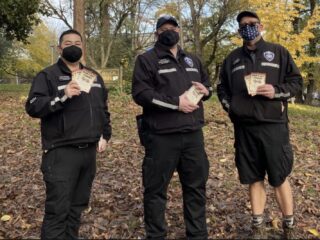
(Photo: City of Portland)
The City of Portland’s dream to remove police officer oversight of automated traffic cameras took a big step closer to reality this week.
House Bill 4105, which would allow non-police bureau staff to review and process traffic camera images and citations, passed the Oregon House by a vote of 32 to 23 on Tuesday. The floor vote followed a 4-3 party-line vote in support of the bill from members of the House Rules Committee on February 8th. All four Democrats on the committee voted in favor of the bill, while the three Republicans voted against it.
The full House vote was less partisan with two Republicans — Representatives Greg Smith (R-Eastern Oregon) and James Hieb (R-Canby/Happy Valley) — joining 30 Democrats to pass the bill. Five Democrats voted against the bill including Representatives Paul Evans (D-Monmouth), Chris Hoy (D-Salem), Mark Meek (D-Clackamas County), Courtney Neron (Washington County/Wilsonville), and Brad Witt (D-Clatskanie).
The Portland Bureau of Transportation is the bill’s primary backer. They’ve become frustrated with a major bottleneck around processing camera citations due in large part to police staffing issues. They also believe armed police officers sitting at a desk looking at images is not the most effective use of their time.
HB 4105 would give cities the option to appoint a non-police “duly authorized traffic enforcement agent” to review camera photos and issue citations. These individuals would be trained, employed, and sworn-in by a non-police agency. In the case of Portland, the transportation bureau already does this with parking enforcement officers. The original bill required these traffic agents to be sworn-in by a law enforcement agency. The amended bill passed this week included language to allow for “a governing body of an incorporated city” to train and appoint the agents.
Advertisement
“The highest and best use of our police officers is public safety and it is not, I would argue, triple-checking photo radar cameras.”
— Barbara Smith-Warner, House Rules Committee chair
That change doesn’t sit well with Rules Committee member Kim Wallan, a Republican who represents Medford. At last week’s work session she said a citation for a moving violation, like speeding or red light running, is much different than a parking ticket. “That to me requires a police officer,” Wallan said. She also expressed a concern that the new traffic agents would not be trained. “I can’t tell you how many bills we’ve heard about how we need better training [of police], so this is untrained people, and now they’re not even going to be employed by the police department for moving violations? I just have so many problems with that. So I will be voting no on the whole thing.”
The agents would be trained so it’s unclear why Rep. Wallan believes otherwise. The text of the bill clearly states that traffic agents would have, “completed all necessary technical, administrative and other training to review photographs and issue citations.”
At the meeting last week, PBOT Safety Division Manager Dana Dickman responded to Rep. Wallan and clarified that these new traffic agents will receive additional training for dealing with court cases and sensitive DMV data. “The reason we differentiate between these speeding tickets and red light violations [captured by cameras] is because there isn’t an interaction. There isn’t a stop. Even though it is a moving violation it is a photographic record.”
Rules Committee Chair Rep. Barbara Smith Warner, who disclosed her spousal relationship with PBOT Director Chris Warner prior to voting at last week’s work session, is a major backer of HB 4105. She likened one its goals to a tobacco tax. “Part of the incentive is to try to get people to change their behavior,” she said. Rep. Smith-Warner also thinks police personnel could be put to better use elsewhere. “The highest and best use of our police officers is public safety and it is not, I would argue, triple-checking photo radar cameras. This is something that can and should be done by trained and sworn employees of these [non-police] departments.”
The bill will now have to pass through the Senate before it becomes law. Stay tuned for updates.

